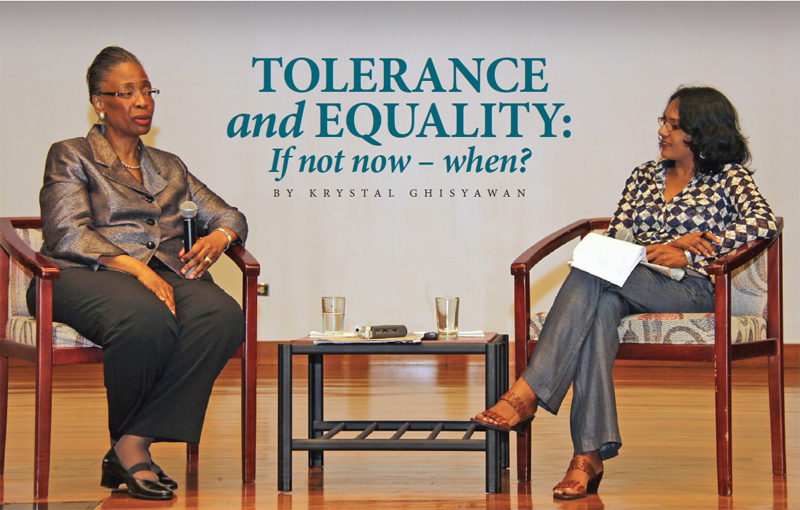|
July 2015

Issue Home >>
|

“Tolerance as an ethical virtue does not require us to accept other people’s choices, but it does require us to respect those choices.”
If no other point is retained from Judge Helen Whitener’s address this one above should be.
Judge Whitener channeled Dr Eric William when she defined “tolerance,” one of our nation’s watchwords and underscored its necessity to the functioning of a healthy democracy as it allows us to disagree about controversial issues and debate our deepest differences in a civil and nonviolent manner. A disposition of tolerance she said, is necessary for the development of enlightened and just policies for resolving contested moral issues, such as disability rights, capital punishment, sexual rights, AIDS and HIV issues and abortion. It was fitting that though hosted by the US Embassy and moderated by journalist, Dr Sheila Rampersad, she delivered this message at Daaga Auditorium, on the St Augustine campus of The UWI – the seat of higher education and progressive thinking.
Using the words of Dr Eric Williams, Judge Whitener outlined democracy as he saw it – the recognition of the rights of others; equal opportunities for all in education and employment; the protection of the weak against the strong; and the government’s responsibility to protect citizens from the arbitrary exercise of power. Questioning whether these founding principles were in fact being observed in the country today, she called on Prime Minister Kamla Persad-Bissessar to take homophobic laws off the books.
She also endorsed the work of local activists groups, like the Silver Lining Foundation which the Judge felt was indicative of an awareness of the shortcomings regarding the equal treatment of ALL citizens. The Foundation was established after the suicide of a young man who was bullied for being gay. If the society was truly tolerant, the Foundation would not need to exist she opined.
A highlight of the talk was when Judge Whitener’s mother, Mrs Joyce Pierre, explained what it was like being a Caribbean woman and having a gay child. “These are people and have their own life to live. They’ve taken a choice, I don’t even know if it’s a choice. It was shocking to me but it is a journey,” she said.
This journey is one from a place of ignorance (not knowing), intolerance (not accepting) and shame, to one of knowledge, understanding and tolerance. Mrs Pierre highlighted the need for parents to be willing to learn from their children, and to take this journey together, by talking through issues of sexuality. Ultimately, parents will face the question “Will I lose my child?” and must determine if trying to maintain dominant intolerant attitudes and behaviours is worth the loss of emotional ties and family.
Before an audience of local activists, academics, lawyers and social workers who work with one or more disenfranchised groups, Judge Whitener acknowledged that she had little knowledge of our current political state and was instead asking: if the nation is proud of her, and her accomplishments as a black, Trinidad-born and raised, openly gay woman, who at age 50 was the youngest person to sit at the highest bench of the United States legal system, why is it not proud of all of its LGBTQI population? (Lesbian, Gay, Bisexual, Transgender, Queer/Questioning, Intersex – LGBTQI is the acronym commonly used, for example, in the US when Secretary of State, Hilary Clinton said that LGBTQI rights are part of the US’s Human rights policy and foreign policy interests)
Yet she was not speaking solely from an LGBTQI rights perspective, rather on a human rights platform which includes all people in disenfranchised positions; emphasising the need for building coalitions across differences be it sexual orientation, (dis)ability, (dis)ease, race, class, and ethnicity.
Drawing on her professional training as a judge, she believed that legislative change was urgently needed to recognise innate rights, to secure space at the table for all citizens, asking, “If not now, when?”
Krystal Ghisyawan is a PhD candidate in Sociology whose work focuses on women in same-sex relationships in Trinidad, their space-making practices and the politics of their identity. |





